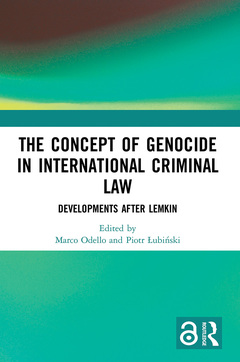The Concept of Genocide in International Criminal Law Developments after Lemkin
Coordonnateurs : Odello Marco, Łubiński Piotr

This book presents a review of historical and emerging legal issues that concern the interpretation of the international crime of genocide.
The Polish legal expert Raphael Lemkin formulated the concept of genocide during the Nazi occupation of Europe, and it was then incorporated into the 1948 Convention on the Prevention and Punishment of the Crime of Genocide. This volume looks at the issues that are raised both by the existing international law de?nition of genocide and by the possible developments that continue to emerge under international criminal law. The authors consider how the concept of genocide might be used in different contexts, and see whether the de?nition in the 1948 convention may need some revision, also in the light of the original ideas that were expressed by Lemkin. The book focuses on speci?c themes that allow the reader to understand some of the problems related to the legal de?nition of genocide, in the context of historical and recent developments.
As a valuable contribution to the debate on the signi?cance, meaning and application of the crime of genocide the book will be essential reading for students and academics working in the areas of Legal History, International Criminal Law, Human Rights, and Genocide Studies.
Chapter 12 of this book is freely available as a downloadable Open Access PDF under a Creative Commons Attribution-Non Commercial-No Derivatives 4.0 license available at http://www.taylorfrancis.com/books/e/9781003015222
Introduction;
PART I Theoretical and Historical Framework
- Rafał Lemkin’s Concept of Genocide vs. the Genocide Convention;
- Crime of genocide in Ukraine (1932-1933);
- Kingpins of Contention: Local-level Dynamics of Mobilization in the Rwandan Genocide;
- The crime of genocide in its (nearly) infinite domestic variety;
- Responsibility of members of the government and other public officials pursuant to Article IV of the 1948 UN Convention on the Protection and Punishment of the Crime of Genocide;
- Transnational Corporations’ Liability for Genocide under International Law;
- Probing the Boundaries of the Genocide Convention: Children as a Protected Group;
- Interaction between Genocide and Superior Responsibility - Conviction for a Special Intent Crime without Proving Special Intent!?;
- "Kill Them All and Let God Sort Them Out" or Why Religiously Motivated Terrorism Should Not Be Confused with the Crime of Genocide
- Blurring the Distinction between Ethnic Cleansing and Genocide;
- Genocide and Culture: Revisiting their Relationship 70 years after the Genocide Convention;
- Social Media Incitement to Genocide – ECHR countries perspective;
PART II International and National Legal Dimensions;
PART III Challenges and New Developments;
Marco Odello, PhD (Madrid), LLM (Nottingham), LLB (Rome), is Reader in Law at Aberystwyth University.
Piotr Łubiński, PhD, is Senior Lecturer at the Institute of Security and Civic Education, Pedagogical University, Krakow, Poland.
Date de parution : 04-2022
15.6x23.4 cm
Date de parution : 07-2020
15.6x23.4 cm
Thèmes de The Concept of Genocide in International Criminal Law :
Mots-clés :
ISIS Propaganda; Great Famine; Nazi occupation of Europe; International Humanitarian Law; Lemkin's concept; Genocide Convention; legal issues; Mens Rea; international criminal law; Genocidal Intent; Dolus Specialis; Rome Statute; ICTY Statute; Joint Criminal Enterprise; Humanitarian Aid; Raphael Lemkin; Atrocity Crimes; Superior Responsibility; Special Intent Crimes; PTCH II; ISIS Activity; Arrest Warrant Case; ISIS Ideology; ICC Element; Jean Paul Akayesu; Hugo Grotius; Ukrainian People; ISIS Fighter



